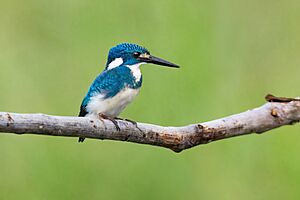Cerulean kingfisher facts for kids
Quick facts for kids Cerulean kingfisher |
|
|---|---|
 |
|
| Conservation status | |
| Scientific classification |
|
| Kingdom: | Animalia |
| Phylum: | Chordata |
| Class: | Aves |
| Order: | Coraciiformes |
| Family: | Alcedinidae |
| Subfamily: | Alcedininae |
| Genus: | Alcedo |
| Species: |
A. coerulescens
|
| Binomial name | |
| Alcedo coerulescens Vieillot, 1818
|
|
| Script error: The function "autoWithCaption" does not exist. | |
Script error: No such module "Check for conflicting parameters".
The cerulean kingfisher (Alcedo coerulescens) is a small, colorful bird. It belongs to the kingfisher family, specifically the group called Alcedininae. These birds are originally from parts of Indonesia.
This kingfisher looks mostly metallic blue. It is very similar to the common kingfisher, but it has a white belly instead of an orange one. Male cerulean kingfishers are usually bluer than females. Females often have a slightly greenish color. Sometimes, people call this bird the "small blue kingfisher." However, in Indonesia and other parts of Asia, that name usually refers to the common kingfisher.
Contents
About the Cerulean Kingfisher
What is a Cerulean Kingfisher?
The cerulean kingfisher is a small bird, about 13 centimeters (5 inches) long. Its top feathers are different shades of blue. It has white spots near its eyes and a clear white patch on each side of its neck. The feathers on its belly are white, with a bright blue band across its chest. Its beak is dark, and its legs are dark brown. Female cerulean kingfishers have slightly duller and greener feathers. Their chest band is also a bit narrower than the males'.
Where Do They Live?
Cerulean kingfishers live in several parts of Indonesia. You can find them on islands like Sumatra, Java, the Kangean Islands, Bali, Lombok, and Sumbawa. These birds stay in one place and do not migrate. They prefer to live in low-lying areas. You can often spot them near streams, canals, and even flooded rice fields. They also like areas where the ocean tides come in, like estuaries.
How Are They Named?
The first official description of the cerulean kingfisher was made in 1818. A French bird expert named Louis Pierre Vieillot gave it its scientific name, Alcedo coerulescens. The word coerulescens comes from a Latin word meaning "bluish." This name perfectly describes the bird's beautiful blue color!
 | May Edward Chinn |
 | Rebecca Cole |
 | Alexa Canady |
 | Dorothy Lavinia Brown |


